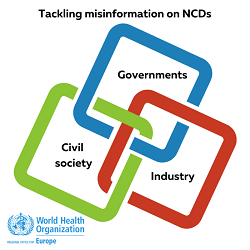Misinformation and noncommunicable diseases

The WHO European Office for the Prevention and Control of Noncommunicable Diseases is bringing together a broad range of stakeholders in a series of meetings to gather the necessary expertise to tackle health disinformation and help build a toolkit of policy initiatives for the future.
Misinformation, which is the unintentional spreading of false information, as well as disinformation, created with the intention of spreading false information for profit or causing harm, have proven to be very dangerous to public health. As more and more individuals obtain their information from digital sources, such as search engines or social media platforms, it becomes exceedingly difficult for users to determine the validity of messages. This is especially concerning in the area of noncommunicable diseases (NCDs), such as cardiovascular diseases and cancer, where poor diet, insufficient physical activity, and tobacco and alcohol use are all risk factors.
Misinformation and disinformation in these areas can influence people’s decisions on health and have a huge effect. This is coupled with a push from industry to promote and market their products to maximize sales and profit – with little regard for the harm their products can cause. However, despite this, the impact of misinformation specifically related to NCDs has not yet been taken up.
To address this issue, WHO/Europe is launching a project to bring together different parts of society to share innovative practices and work together on policy initiatives to tackle misinformation on NCDs and associated risk factors.
The series of meetings will:
- identify barriers, challenges and possible ways to fight health disinformation;
- discuss ongoing initiatives in the field of health disinformation, exchanging best practices and relevant experience;
- debate the role of relevant stakeholders and their impact on policy-making;
- discuss the impact of digital literacy on the reduction of health disinformation; and
- showcase success stories and innovative practices.
The expected outcome of the 3 meetings will be to create a triple entente of stakeholders, collecting valuable inputs from Member States, the media and social media sectors, as well as civil society, contributing to the development of a toolkit of policy recommendations for WHO European Region Member States with the aim of tackling the negative impacts of misinformation on NCDs.



